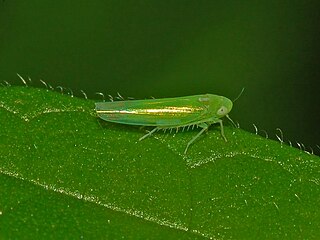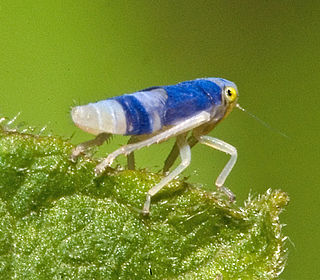
Leafhopper is the common name for any species from the family Cicadellidae. These minute insects, colloquially known as hoppers, are plant feeders that suck plant sap from grass, shrubs, or trees. Their hind legs are modified for jumping, and are covered with hairs that facilitate the spreading of a secretion over their bodies that acts as a water repellent and carrier of pheromones. They undergo a partial metamorphosis, and have various host associations, varying from very generalized to very specific. Some species have a cosmopolitan distribution, or occur throughout the temperate and tropical regions. Some are pests or vectors of plant viruses and phytoplasmas. The family is distributed all over the world, and constitutes the second-largest hemipteran family, with at least 20,000 described species.
Dziwneono (subfamily:Typhlocybinae) is a genus of Australian leafhoppers, with more than ten undescribed species. It was described in 1972 by Polish entomologist Irena Dworakowska.
Sweta is a genus of leafhopper in the subfamily Typhlocybinae, with two species. The genus name is derived from the Sanskrit word for white, the type species S. hallucinata being predominantly whitish. The genus has an elongate pronotum which is unusual in Typhlocybinae and seen only in the Signoretiinae. A second species Sweta bambusana was described from China in 2012.
Empoasca onukii, the tea jassid, is an insect species belonging to the subfamily Typhlocybinae of the family Cicadellidae. Plant hosts include Gossypium (cotton) species and, notably, Camellia sinensis. The species is distributed throughout East, Southeast, and South Asia.

Empoasca is a genus of leafhoppers belonging to the family Cicadellidae subfamily Typhlocybinae.

Typhlocybinae is a subfamily of insects in the leafhopper family, Cicadellidae. This is currently the second largest leafhopper subfamily based on the number of described species, but researchers believe there are so many taxa yet undescribed that it is probably the largest subfamily. Approximately 6000 species have been described thus far.

Erythroneurini is a tribe of leafhoppers in the subfamily Typhlocybinae, with over 200 genera.
Jennidayus is a genus of hooded shrimps in the family Gynodiastylidae. They Jennidayus is a genus of hooded shrimps in the family Gynodiastylidae. There are three species in this genus, found in Australia.

Empoascini is a tribe of leafhoppers in the subfamily Typhlocybinae.
Alebrini is a leafhopper tribe in the subfamily Typhlocybinae.

Dikraneurini is a leafhopper tribe in the subfamily Typhlocybinae.

Typhlocybini is a leafhopper tribe in the subfamily Typhlocybinae.

Alebra is a genus of leafhoppers in the subfamily Typhlocybinae. They genetically evolved their exoskeleton to achieve vibrant colors to defend themselves from predators.

Dikrella is a genus of leafhoppers belonging to the family Cicadellidae subfamily Typhlocybinae. It contains approximately 37 species occurring in the United States, Mexico, Costa Rica, Cuba, Puerto Rico, Panama, Ecuador, Colombia, and Brazil.
Tricella is a genus of robber flies in the family Asilidae. There is at least one described species in Tricella, T. calcar.
Irena Dworakowska is a Polish entomologist who specialized in hemipterology.

Erasmoneura vulnerata is a species of leafhopper native to North America. The species was found to be in Europe in 2004 where it causes significant economic damage to grapevine yards. E. vulnerata is commonly found on wild and cultivated grapes from both continents. Its Latin name translates to "wounded Erasmoneura" from its original description.
Qadria is a genus of true bugs belonging to the family Cicadellidae (leafhoppers). Belonging to the Erythroneurini tribe, Qadria consists of fourteen species.

Dikraneura is a genus of leafhoppers belonging to the family Cicadellidae subfamily Typhlocybinae. It contains approximately 50 species, with a primarily holarctic distribution, being poorly represented in the tropics.








